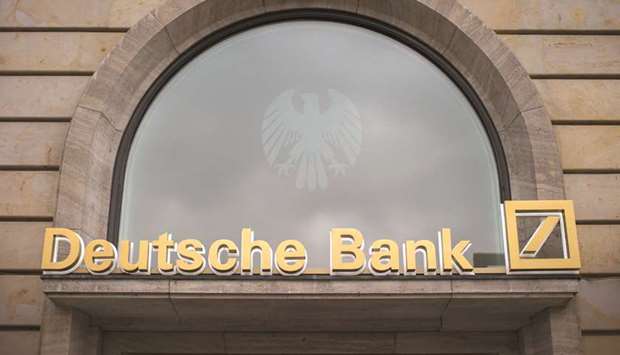Deutsche Bank AG may have defused a potential land mine in its still-fragile turnaround.
A once-treacherous decision about whether to retire one of the bank’s riskiest bonds in April has almost become a non-event amid signs of progress in the overhaul and overwhelming evidence of the lender’s ability to sell Additional Tier 1 notes in a red-hot market.
The bank has also avoided much of the opacity that riled Banco Santander SA bondholders ahead of a similar AT1 call decision last year.
“They’ve done everything right, particularly since this is an asset class that’s created so many problems for them in the past,” said Sebastiano Pirro, a portfolio manager at Algebris Investments. The upcoming AT1 call decision “won’t be a big deal either way,” he said. Pirro declined to comment on Algebris’s holdings.
Potential market indifference about the call marks a sharp turnaround for the unprofitable lender, as its AT1s have been whipsawed for years by concerns about capital levels, coupon payments and the ability to sell new notes. It also reflects a focus on investor communication that has let the German lender sidestep the confusion and complaints triggered by Santander’s unprecedented skipped call.
“I don’t think it matters hugely whether they call or not, as long as they don’t follow the same path as Santander,” said Filippo Alloatti, a senior credit analyst at Hermes Investment Management.
Market regulations bar Deutsche Bank from indicating whether it will redeem the old AT1 before it issues an official call notice. The announcement can come as late as 25 days before the voluntary April 30 redemption date. If the $1.25bn 6.25% bond is left outstanding, the coupon will reset to about 436 basis points over five-year swaps, which currently works out at about 5.7%.
The bank has explained how it will decide whether to exercise the call, and made it clear that selling new AT1s doesn’t necessarily mean that old ones will be redeemed. It declined to comment on the call decision when contacted by Bloomberg News, including on whether it has received regulatory permission for a redemption.
On February 11, the bank bagged a bumper $14bn order book as it sold a new $1.25bn perpetual AT1, its first such offering since 2014. The sale extended a run of recent wins for chief executive officer Christian Sewing, including a surge in fixed-income trading last quarter and a share-price boosting investment from US fund manager Capital Group.
“The AT1 issue is another step forward in the active, diligent balance sheet management we’ve been undertaking over the past three years,” Group Treasurer Dixit Joshi told Bloomberg News.
Still, the bank will pay a 6% coupon on the bond, suggesting investors needed a hefty incentive to take on the risk amid continued losses and falling revenue at key units.
The yield, which is now about 5.7%, is the highest for any outstanding AT1, based on Bloomberg Barclays index data.‘
Deutsche Bank’s bondholders may have drawn comfort from the relatively muted price reaction to better-rated Santander’s howl-inducing AT1 rollover last year. The price of the extended note quickly recovered, and the Spanish lender had no difficulties selling a new issue this year.
“In Santander’s case, the problem wasn’t the extension, it was the communication – and Deutsche Bank is super focused on this,” Pirro said.

A sign sits above the entrance to a Deutsche Bank branch in Frankfurt.
